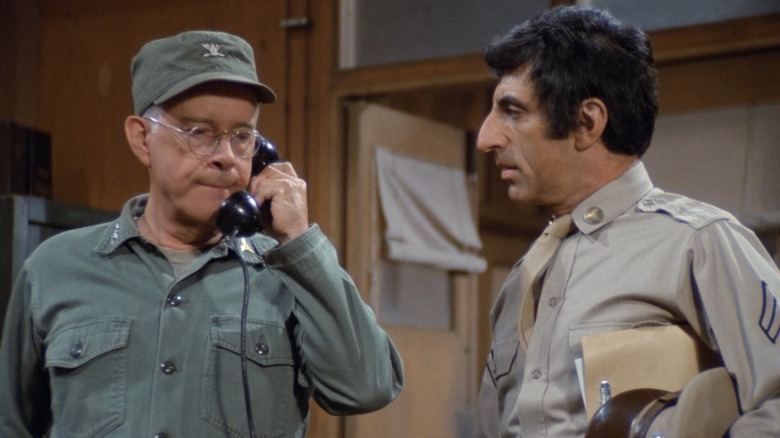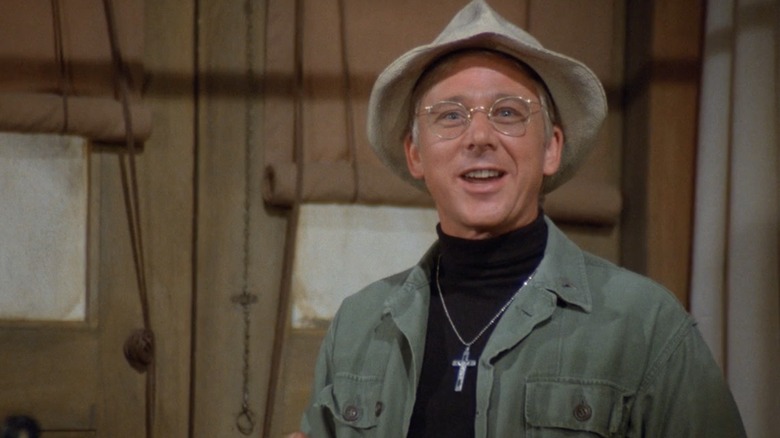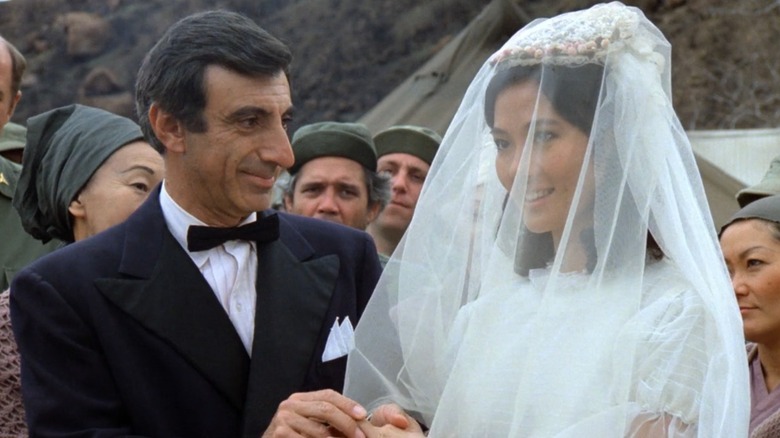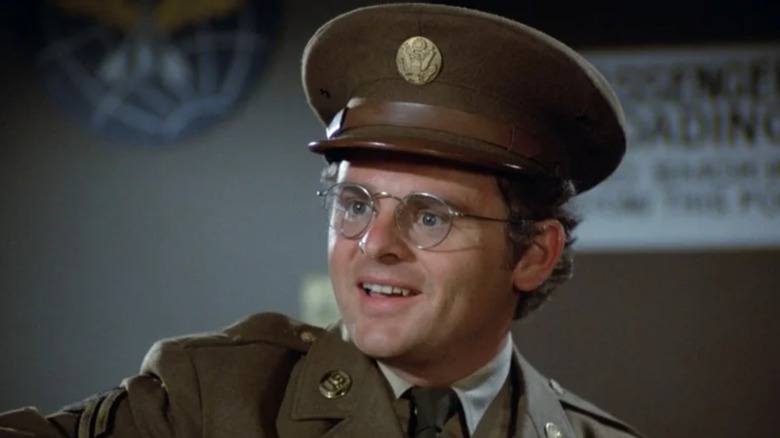The Short-Lived M*A*S*H Spinoff Everyone Totally Forgot About
If you caught up with "M*A*S*H" sometime after the beloved wartime sitcom ended its much-lauded original run, you'd be forgiven for having no clue about the series' spinoffs. After all, 50 years after it first aired, "M*A*S*H" remains a major pillar of TV history — for its rollicking anti-authority spirit and bleeding heart attitude, its genre-blending and experimental episodes, and its record-breaking finale telecast, which is still by some measures the most-watched in the history of television. "AfterMASH," though? Well, not so much.
It's a testament to the flagship series' strengths that decades after it ended, its bizarre and short-lived spinoffs haven't tainted its reputation at all. In fact, they've mostly been forgotten, in part because they're unavailable on streaming and tough to find on home video. Three "M*A*S*H" spinoffs were made in hopes of capitalizing on some of the original series' magic (including "Trapper, M.D." and "W*A*L*T*E*R"), but only one — the 1983 hospital series "AfterMASH" – featured several major cast members and a plot that directly followed the events of the series finale.
What happened after M*A*S*H? Well, AfterMASH
In retrospect, "AfterMASH" probably never stood a chance, but the series sounded promising when it was first conceived. When Alan Alda and the team behind "M*A*S*H" decided to end the show on a high note with its eleventh season, a few actors still felt like the premise had some gas left in the tank. William Christopher, who played sweet chaplain Father Mulcahey, Jamie Farr, who played crossdressing company clerk Klinger, and Harry Morgan, who played wise, paternal boss Colonel Potter, were all open to continuing on. "M*A*S*H' would still be going on today if Alan [Alda] and Mike [Farrell] and Loretta [Swit] and David [Ogden Stiers] hadn't said they'd had enough," Morgan said in Suzy Gershman's 1984 book "The Complete Book of M*A*S*H."
The three remaining lead actors did get the chance to continue on, and series creator Larry Gelbart, who had left the original show after season 4, even decided to return. "Gelbert decided to sign on, stating that he would stick around for the pilot and the first few scripts," Dale Sherman wrote in the book "MASH FAQ." Instead, he says, "he would end up staying for much longer." Latter-season "M*A*S*H" executive producer Burt Metcalfe and writers Dennis Koenig, Ken Levine, and David Isaacs all stuck around, too, setting up a strong group of returning cast and crew members with which to launch a series.
Constant changes kept the show from finding its footing
Then "AfterMASH" actually started. The show was set at a veteran's hospital in Missouri, where the three supporting characters end up working together treating people who were impacted by the war. The setting provided space for some of the compassionate social commentary "M*A*S*H" fans already knew and loved from the original series, but the show was also beset by behind-the-scenes changes and odd writing choices.
The perfectly complex conclusions Klinger and Mulcahy ended with in "Goodbye, Farewell, and Amen" were retconned, with Klinger returning to the U.S. with his wife Soon-Lee (Rosalind Chao) right after the pair decided to stay, and Mulcahey's hearing loss quickly reversed by a surgical procedure. As Sherman notes in "MASH FAQ," even Potter's story is dulled somewhat when his oft-mentioned wife, Mildred, a figure of common sense practicality in the original show, was made into "more of an airhead" after the original actress was recast.
"AfterMASH" is remembered as a flop, but it actually saw some success in its first season. One episode earned Gelbart a Peabody Award, and the show was among the top 20 most-watched on TV during its initial run. Still, it was inconsistent, and studio interference showed through in the constant changes taking place on screen. In addition to Mildred Potter's recast, Jay O. Sanders' character, Dr. Pfeiffer, was quickly replaced, and John Chapel's hospital administrator Mike D'Angelo left between seasons. A psychiatrist character was brought in, Klinger was thrown into a strange plot in which he was on the run from the law, and – perhaps worst of all – the show got moved to a time slot opposite the much more popular series "The A-Team."
This isn't even the weirdest M*A*S*H spinoff
Watching the pieces of "AfterMASH" that are available now (episodes still circulate on YouTube), there are other issues, too. The scripts are clunky and the new cast members don't quite gel with our old favorites. Without a screen presence as strong as that of Alan Alda's Hawkeye, the show feels fractured. Plus, absent the spatial freedom of the outdoor military camp set, the show's visuals look much less creative and kinetic than its predecessor's. "AfterMASH" only made 31 total episodes, and one of them – the last one – never actually aired. The show was cut short early in its second season, and few of its stars ever spoke much about it after its conclusion.
In his book "M*A*S*H," David Scott Diffrient says that the show was "riddled with critical bullets" upon release and was seen by many "as an obvious attempt by network executives to ride the coattails of the original series." Sherman calls it CBS' "Frankenstein monster," one "that had been built out of parts of the former body and other pieces." Oddly enough, though, for all its false starts and failures, "AfterMASH" isn't even the most misguided or least successful "M*A*S*H" spinoff. That would be "W*A*L*T*E*R," a Radar-centric series that reimagined the show's sweetest, most naive character as newly single, suicidal, and – in one of the weirdest writing choices imaginable – now a rookie cop. Unsurprisingly, that show never made it past the pilot stage.



